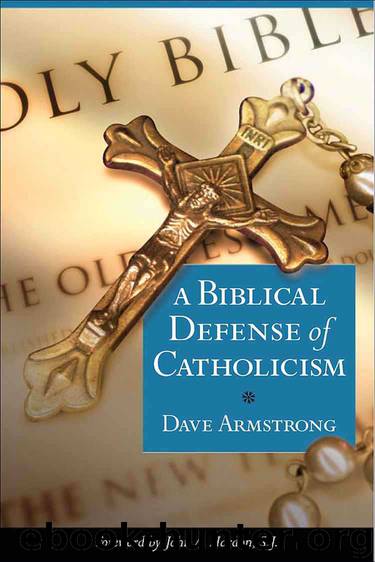Biblical Defense of Catholicism by Armstrong Dave

Author:Armstrong, Dave [Armstrong, Dave]
Language: eng
Format: epub
Publisher: Sophia Institute Press
Published: 2012-08-20T16:00:00+00:00
Scriptural evidence for Penance
Exodus 32:30: “Moses said to the people, ‘You have sinned a great sin. And now I will go up to the Lord; perhaps I can make atonement for your sin’ ” (read also 32:31-32).
Here we have an example of vicarious atonement, whereby one member of the chosen people (analogous, of course, to the Church), sought to atone for others. This concept is essentially no different from intercessory prayer. The Catholic Church simply takes it further by stating that various works of charity, as well as voluntary and involuntary suffering, are efficacious for the purpose of blessing others and atoning for their sins. Furthermore, the notion of ritual blood atonement is common throughout the Old Testament (e.g., Exod. 29, 30; Lev. 4, 14, 16).
Such sacrifices were certainly but shadows of the great Atonement of Christ on the Cross. Yet they also prefigured vicarious atonement between and among Christians, since Moses, the priests, etc., were mere men who atoned for the Israelites in the sense of participating in the rituals foreordained and empowered by God .
Numbers 14:19-23: “ ‘Pardon the iniquity of this people, I pray thee, according to the greatness of thy steadfast love, and according as thou hast forgiven this people, from Egypt even until now.’ Then the Lord said, ‘I have pardoned, according to your word; but truly, as I live, and as all the earth shall be filled with the glory of the Lord, none of the men who have seen my glory and my signs which I wrought in Egypt and in the wilderness, and yet have put me to the proof these ten times and have not hearkened to my voice, shall see the land which I swore to give to their fathers; and none of those who despised me shall see it.’ ”
God forgave the Israelites (14:20), due, at least in part to Moses’ intercession (14:19). Yet punishment, or penance, remained (14:23) because of their exceedingly great disobedience, despite seeing signs and wonders (14:22). Thus, forgiveness is not complete in the sense that it removes all the ramifications of sin, or “cancels out” any further need for satisfaction and penitential acts, either undertaken voluntarily, ordered by legitimate Church authority, or ordained by God Himself by means of trials and tribulations.
Numbers 16:46-48: “And Moses said to Aaron, ‘Take your censer, and put fire therein from off the altar, and lay incense on it, and carry it quickly to the congregation, and make an atonement for them; for wrath has gone forth from the Lord; the plague has begun.’ So Aaron took it as Moses said, and ran into the midst of the assembly; and, behold, the plague had already begun among the people; and he put on the incense, and made atonement for the people. And he stood between the dead and the living; and the plague was stopped. ”
This is another clear example of vicarious atonement, as in Exodus 32:30-32.
Numbers 25:11-13: “Phinehas the son of Eleazar, son of Aaron the priest, has
Download
This site does not store any files on its server. We only index and link to content provided by other sites. Please contact the content providers to delete copyright contents if any and email us, we'll remove relevant links or contents immediately.
The Lost Art of Listening by Michael P. Nichols(6498)
Why I Am Not A Calvinist by Dr. Peter S. Ruckman(3779)
The Rosicrucians by Christopher McIntosh(3063)
Wicca: a guide for the solitary practitioner by Scott Cunningham(2713)
Signature in the Cell: DNA and the Evidence for Intelligent Design by Stephen C. Meyer(2509)
Real Sex by Lauren F. Winner(2492)
The Holy Spirit by Billy Graham(2436)
To Light a Sacred Flame by Silver RavenWolf(2362)
The End of Faith by Sam Harris(2302)
The Gnostic Gospels by Pagels Elaine(2043)
Nine Parts of Desire by Geraldine Brooks(2012)
Waking Up by Sam Harris(1969)
Heavens on Earth by Michael Shermer(1961)
Devil, The by Almond Philip C(1910)
Jesus by Paul Johnson(1897)
The God delusion by Richard Dawkins(1861)
Kundalini by Gopi Krishna(1830)
Chosen by God by R. C. Sproul(1773)
The Nature of Consciousness by Rupert Spira(1698)
